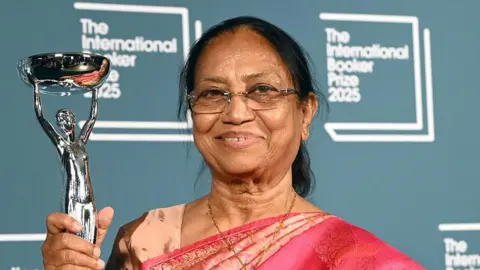In a remarkable achievement for Indian literature, Banu Mushtaq has garnered global attention by winning the prestigious International Booker Prize for her short story anthology, *Heart Lamp*. This accolade marks a historic milestone as she becomes the first author writing in the Kannada language to secure this honor. The anthology, which features a collection of twelve evocative short stories penned by Mushtaq between 1990 and 2023, poignantly depicts the complex lives and struggles of Muslim women in southern India.
The International Booker Prize is venerated for recognizing outstanding works translated into English, and *Heart Lamp* is unique in that it is the first short story collection to receive this award. Critics and judges alike have praised Mushtaq’s characters as “astonishing portraits of survival and resilience,” emphasizing the depth and realism embedded in the narratives. The anthology has been translated into English by Deepa Bhasthi, who will share the £50,000 prize, bringing the tales and voices of Kannada literature to an expansive audience.
During her acceptance speech at the Tate Modern in London, Mushtaq expressed heartfelt gratitude to her readers for embracing her work with open minds and hearts. She articulated her deep-seated belief that no story is insignificant and emphasized that every narrative contributes to the intricate tapestry of human experience. “In a world that often tries to divide us, literature remains one of the last sacred spaces where we can live inside each other’s minds,” Mushtaq stated, underscoring the unifying power of storytelling.
Mushtaq’s triumph at the International Booker Prize is particularly historical given its precedents. Her win follows that of Geetanjali Shree’s *Tomb of Sand*, which was translated from Hindi by Daisy Rockwell and claimed the award in 2022. This successive recognition of South Asian literary voices is heralded as a positive shift in the global literary landscape, advocating for more translations from regional languages.
Banu Mushtaq’s literary journey reflects her resilience and overcoming of personal challenges. Growing up in Karnataka, she was immersed in the Urdu language through her early education, but her father—believing in the need for broader educational opportunities—enrolled her in a convent school where she was taught in Kannada. Although the shift presented challenges, she embraced her new language and dedicated herself to storytelling.
Despite facing societal expectations and personal hurdles, including depression following a love marriage and the struggle to define her identity beyond domestic confines, Mushtaq remained steadfast in her aspiration to write. Her narratives often tackle themes surrounding the intersection of gender, faith, and societal constraints, echoing the real-life struggles faced by many women around her.
*Heart Lamp* features characters who embody courage, resistance, and agency. The stories resist the stereotypes often associated with Muslim women, showcasing their complexities and diverse experiences. *The Indian Express* noted that Mushtaq’s work insists on the value of directing attention to the lives that occur “at the edges” of society, a testament to her nuanced storytelling and commitment to authenticity.
Mushtaq’s career has spanned multiple professions, including journalism and law, which have enriched her perspectives as a writer. Besides *Heart Lamp*, she has produced a wealth of literary works, and her writings have often garnered significant accolades. However, her fearless approach to expressing powerful ideas has also drawn unwarranted attention, including threats and a fatwa issued in 2000 for her outspoken views on women’s rights within Islam.
Through it all, her immersive and reflective narratives continue to resonate, giving voice to the silenced and framing their struggles within the larger framework of human rights and equality. The recognition from the International Booker Prize is not just a personal victory for Mushtaq but also signals a growing appreciation for literature that emerges from diverse cultural contexts and chronicles underrepresented voices.
Banu Mushtaq’s journey from her small town in Karnataka to the global literary stage highlights the transformative power of literature. It reflects the collective history and trials of women and marginalized communities, urging readers to engage with these vital stories and fostering a dialogue that transcends geographical boundaries. As her work garners more attention, Mushtaq stands as a beacon for aspiring writers and a champion for social justice through storytelling.



